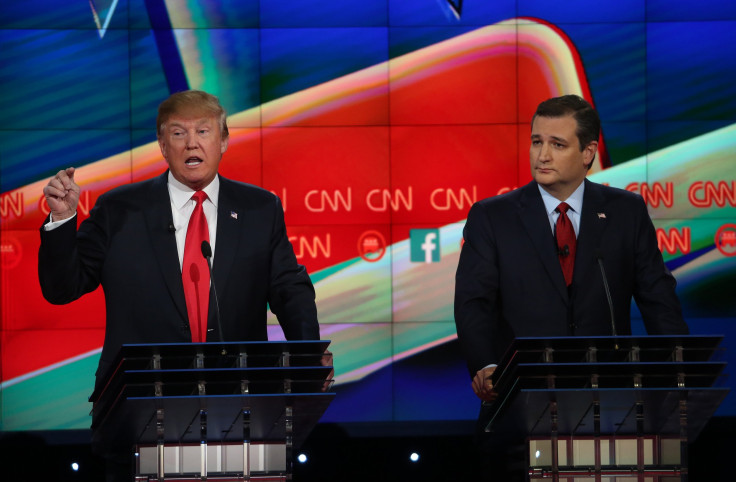Is The Middle East Better Off With Dictators? Republican Candidates Sound Off On Foreign Policy Strategy During Debate

One issue on which Republican presidential candidates widely disagreed during Tuesday’s debate was how to deal with dictators in countries where terrorists thrive. The mix of opinions echoed the last GOP debate in November, when candidates’ responses revealed the deep divides on national security policy among the 2016 field.
This time, the questions began when moderator Wolf Blitzer asked Texas Sen. Ted Cruz about his previous comments that the world would be safer if Saddam Hussein were still in power in Iraq, Moammar Gadhafi still ruled Libya and Hosni Mubarak still ruled Egypt.
“I believe in an America-first foreign policy, that far too often President [Barack] Obama and Hillary Clinton -- and, unfortunately, more than a few Republicans -- have gotten distracted from the central focus of keeping this country safe,” Cruz said.
Cruz added that Obama and Clinton have acted in the interest of spreading democracy in the Middle East, a priority he said he sees as less important than fighting terrorists like the Islamic State group, also known as ISIS or ISIL. He then turned his attention to Syrian President Bashar Assad.
“If we topple Assad, the result will be ISIS will take over Syria, and it will worsen U.S. national security interests,” Cruz said. “We ought to hunt down our enemies and kill ISIS rather than creating opportunities for ISIS to take control of new countries.”
Other candidates were asked similar questions, or jumped in to criticize their rivals. Here are their responses:
Florida Sen. Marco Rubio: When asked whether he regretted supporting Obama’s intervention in Libya, Rubio said that Gadhafi was already on his way out and the U.S. needed to get involved before it happened.
“Look, we will have to work around the world with less-than-ideal governments. The government in Saudi Arabia is not a democracy, but we will have to work with them. The government in Jordan is not perfect, but we will have to work with them,” Rubio said. “But anti-American dictators like Assad, who help Hezbollah, who helped get those IEDs [improvised explosive devices] into Iraq, if they go, I will not shed a tear.”
Ohio Gov. John Kasich: “I don't understand this thing about Assad. He has to go. Assad is aligned with Iran and Russia. The one thing we want to prevent is we want to prevent Iran being able to extend a Shia crescent all across the Middle East. Assad has got to go.”
Donald Trump: "We've spent $4 trillion trying to topple various people that, frankly, if they were there and if we could've spent that $4 trillion in the United States to fix our roads, our bridges, and all of the other problems; our airports and all of the other problems we've had, we would've been a lot better off. I can tell you that right now. We have done a tremendous disservice, not only to the Middle East, we've done a tremendous disservice to humanity. The people that have been killed, the people that have wiped away, and for what? It's not like we had victory.”
Carly Fiorina: The businesswoman interjected to criticize Trump. “That is exactly what President Obama said. I'm amazed to hear that from a Republican presidential candidate,” Fiorina said.
Ben Carson: “No one is ever better off with dictators, but there comes a time, you know, when you're on an airplane, they always say, 'In case of an emergency, oxygen masks will drop down. Put yours on first and then administer help to your neighbor.' We need oxygen right now.
"And we need to start thinking about the needs of the American people before we go and solve everybody else's problems. The fact of the matter is, is that the Middle East has been in turmoil for thousands of years. For us to think that we're going to in there and fix that with a couple of little bombs and a few little decorations is relatively foolish.”
Former Florida Gov. Jeb Bush: Blitzer asked Bush if he believes getting rid of Saddam Hussein was a good idea given what has happened in Iraq since the end of Saddam's regime in 2003.
“I do. I think the lessons learned are that we have to have a strategy to get in and a strategy to get out. Which means, that you create a stable situation,” Bush said.
Kentucky Sen. Rand Paul: “I don't think because I think the regime change was a bad idea it means that Hussein was necessarily a good idea,” Paul said.
He warned that a regime change does not necessarily mean peace. “Out of regime change you get chaos. From the chaos you have seen repeatedly the rise of radical Islam,” Paul added. “So we get this profession of, oh my goodness, they want to do something about terrorism and yet they're the problem because they allow terrorism to arise out of that chaos.”
Many of the Republicans on Tuesday blamed Obama and Clinton for mistakes on foreign policy -- a frequent theme of the night. In addition to fighting with each other about the best tactics in the Middle East, the GOP candidates often turned to hitting Democrats when they wanted to emphasize a point -- and on dictators, that proved a popular move.
© Copyright IBTimes 2025. All rights reserved.





















